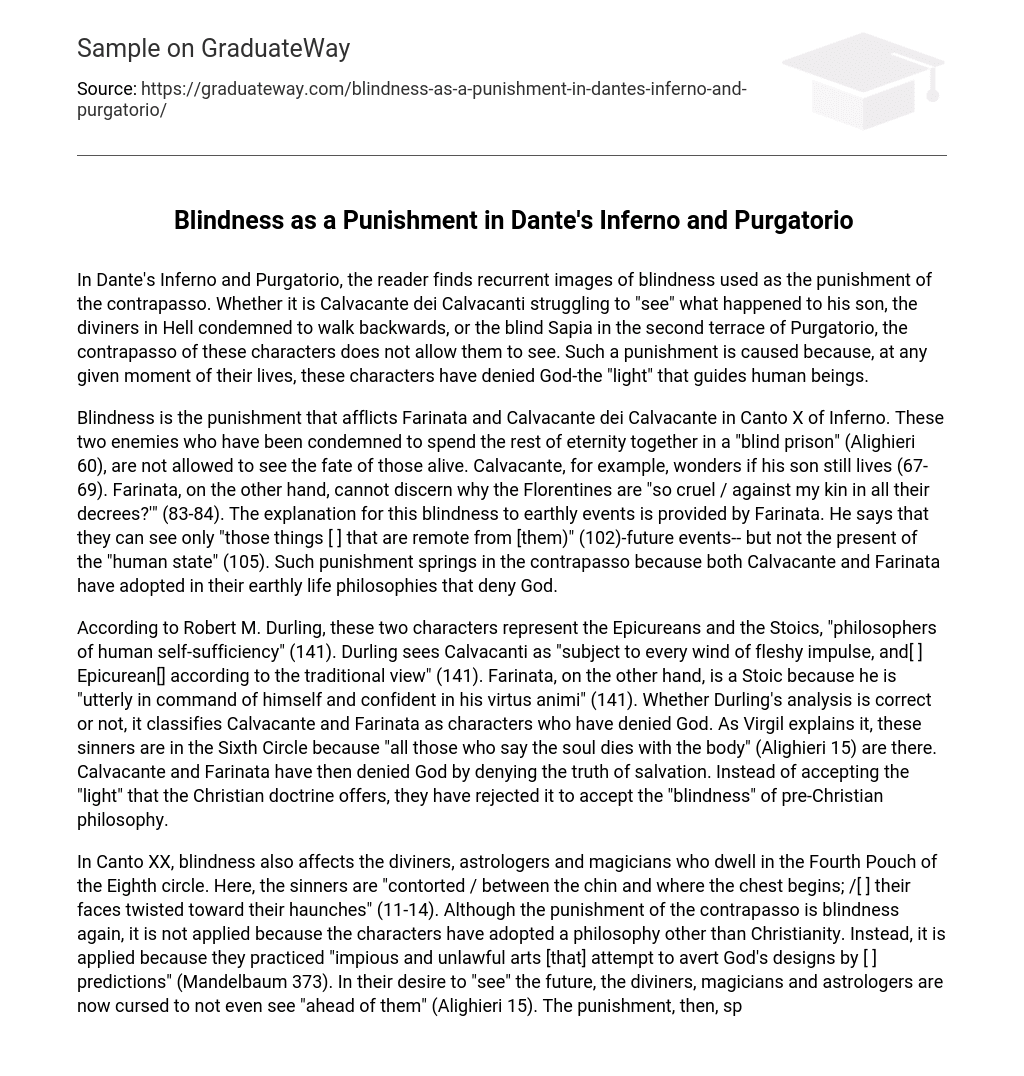In Dante’s Inferno and Purgatorio, the reader finds recurrent images of blindness used as the punishment of the contrapasso. Whether it is Calvacante dei Calvacanti struggling to “see” what happened to his son, the diviners in Hell condemned to walk backwards, or the blind Sapia in the second terrace of Purgatorio, the contrapasso of these characters does not allow them to see. Such a punishment is caused because, at any given moment of their lives, these characters have denied God-the “light” that guides human beings.
Blindness is the punishment that afflicts Farinata and Calvacante dei Calvacante in Canto X of Inferno. These two enemies who have been condemned to spend the rest of eternity together in a “blind prison” (Alighieri 60), are not allowed to see the fate of those alive. Calvacante, for example, wonders if his son still lives (67-69). Farinata, on the other hand, cannot discern why the Florentines are “so cruel / against my kin in all their decrees?’” (83-84). The explanation for this blindness to earthly events is provided by Farinata. He says that they can see only “those things [ ] that are remote from [them)” (102)-future events– but not the present of the “human state” (105). Such punishment springs in the contrapasso because both Calvacante and Farinata have adopted in their earthly life philosophies that deny God.
According to Robert M. Durling, these two characters represent the Epicureans and the Stoics, “philosophers of human self-sufficiency” (141). Durling sees Calvacanti as “subject to every wind of fleshy impulse, and[ ] Epicurean[] according to the traditional view” (141). Farinata, on the other hand, is a Stoic because he is “utterly in command of himself and confident in his virtus animi” (141). Whether Durling’s analysis is correct or not, it classifies Calvacante and Farinata as characters who have denied God. As Virgil explains it, these sinners are in the Sixth Circle because “all those who say the soul dies with the body” (Alighieri 15) are there. Calvacante and Farinata have then denied God by denying the truth of salvation. Instead of accepting the “light” that the Christian doctrine offers, they have rejected it to accept the “blindness” of pre-Christian philosophy.
In Canto XX, blindness also affects the diviners, astrologers and magicians who dwell in the Fourth Pouch of the Eighth circle. Here, the sinners are “contorted / between the chin and where the chest begins; /[ ] their faces twisted toward their haunches” (11-14). Although the punishment of the contrapasso is blindness again, it is not applied because the characters have adopted a philosophy other than Christianity. Instead, it is applied because they practiced “impious and unlawful arts [that] attempt to avert God’s designs by [ ] predictions” (Mandelbaum 373). In their desire to “see” the future, the diviners, magicians and astrologers are now cursed to not even see “ahead of them” (Alighieri 15). The punishment, then, springs from defying a Christian rule that forbids divination.
Finally, blindness grieves the Envious in the Second terrace of Purgatorio, (Canto XIII). These sinners have “iron wire pieces and sews up/ the lids of all those shades” (70 71). The reader wonders why these sinners are punished with blindness because they are envious. I believe that the punishment fits the crime because envious people cannot see their neighbors do better than them. The contrapasso is effective, then, because it ironically grants to the envious their most ardent desire: not to “see.” Sapia, the most relevant character of this canto, also confirms that those who deny God lose their sight in The Divine Comedy. Her fault is to assume that her enemies are defied not by God’s will but because she prayed for such a favor. By claiming” “Now I fear you no more!’” (122) after her prayer has been granted, Sapia denies the supremacy of God and loses her sight. As a conclusion, it can be said that the blind sinners in Dante’s Inferno and Purgatorio suffer this punishment because they have rejected God in some form. Whether they adopt philosophies that deny God’s existence or forbidden practices and openly defy God, these sinners are condemned because they could never “see” the truth that God provides.





